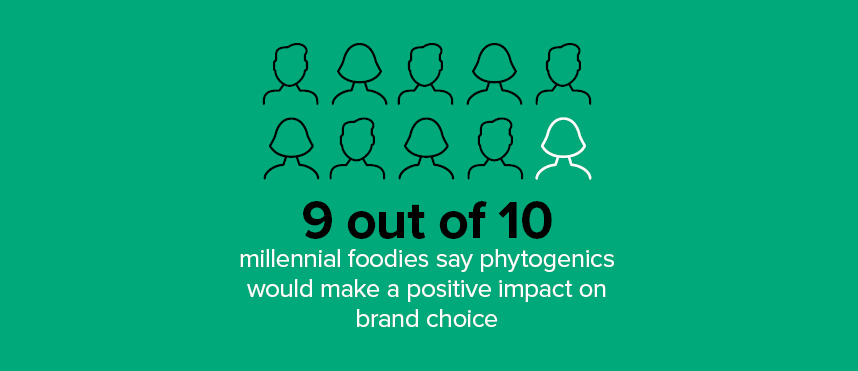Millennial foodies: Connecting with the consumers of today and tomorrow
Why should a feed additive company get in touch with end consumers? Are phytogenics a too far-fetched concept for consumers and their average food choice? Are asking yourself questions like these? We already conducted two surveys to provide you qualified answers. Let's see what we found out.
Markus Dedl, CEO of Delacon, talked to Fabian Brockotter, Editor of Poultry World about connecting with millennials – the consumers of today and the spenders of tomorrow.
“Consumers have the power to change every aspect of the animal livestock industry. Their concerns, their acceptance of production methods, should be critical in how our customers and how we ourselves organise our businesses”, says Delacon CEO Markus Dedl. He commissioned a survey among millennial foodies to get insights into their take on food production.

Who are millennials?
Millennials, born between the early 80s and mid 90s, are the most highly educated and culturally diverse group of all generations, closely connected to their social and environmental surroundings they are expected to make up approximately half the workforce by 2020.
They are the consumers of today and will be the big spenders of tomorrow. “It is this group of people, highly involved with what they eat and how it is produced, we need and want to communicate with”, says Dedl.
“We think there is a tremendous opportunity to connect with millennials with a story about animal wellness, good management practices and natural plant-based feed ingredients.“
Why would an additive company connect with consumers, while their primary business is with the feed industry?
Markus Dedl: “We at Delacon claim that we are pioneers in our field of expertise. Being at the forefront of the industry means that we have to look beyond the borders of day-to-day business. We want to have an information base that goes well beyond what is expected from us to be able to help our customers in offering the best choice for their customers.”

How does that pan out?
“It’s essential to know what makes the world go round on a consumer’s level. Yes, we develop and manufacture additives, our customers make feed and their customers produce animal protein. That said, there is a great potential to interact with consumers and educate them about the way we cater to their protein needs. We have to be honest, agriculture has a dilemma to some extent when it comes to consumer trust and communication. We want to be transparent, in order to do that we have to communicate and above all, have an honest story to tell.”
I can imagine that the concept of phytogenics is somewhat far-fetched for the average consumer. How do you bridge the knowledge gap?
“Of course phytogenics aren’t on the average consumer’s radar. However, millennial foodies do care about animal well-being and the environment. When selecting their food, they actively search for added value propositions such as ‘raised with good animal welfare practices’, ‘raised without antibiotics’ and ‘raised in ways that reduce environmental impact’. They can relate to the fact that raising and feeding chickens with herbs and plant extracts contributes to overall ‘well-being’. The benefits of feeding phytogenics, with the potential to promote gut health, reducing ammonia emissions and being a proven performer in antibiotic-free production, support a compelling narrative.”
What did you learn from the survey among millennial foodies?

“First of all they ‘dig’ the concept of plant-based feed ingredients. The survey showed that nine out of ten millennials say meat and poultry produced with phytogenics would have a positive impact on their brand choice. Secondly, there is a way we can communicate with them. Nearly two-thirds of them look at food labels closely, suggesting an untapped opportunity for food brands to differentiate themselves with the powerful story of phytogenics.”
What can you do with the results?
“Realising that if millennial foodies knew that animals were fed phytogenics, 62 % of them would feel great about their food choice and that will help us to connect with them. This is an outcome we can have discussions about with our customers, discussing marketing and food labelling strategies to differentiate their food brands. As mentioned before, as a pioneer, we see it as our duty to help customers by developing and providing solutions that work. For the producers themselves, for the animals, for the environment and of course for the consumers.”
Just recently the European Center for Disease Control issued an alarming statement that bacteria resistant to antibiotics are on the increase. Is the growing awareness helpful to your business?

“Consumers and legislators demand that the livestock industry know their production is sound, using only the minimum amounts of medicines. Supporting animal gut health and integrity with phytogenic feed additives does certainly help in reaching this goal. That said, the silver bullet that can replace all antibiotics doesn’t come from us. We are realistic enough to see that we are only a part of the antibiotic-free solution. We see some good combinations between phytogenics and for instance esterified MCFA’s (medium chained fatty acids), but they only work well when we truly understand the problems the animals face.”
Are phytogenics top-of-mind when it comes to phasing out antibiotics?
“The phasing out of antibiotics from feed has certainly accelerated our business to some extent. Especially in the US. But we also sell our products in countries where antibiotics are still allowed. That said, many know that there is an expiration date on in-feed antibiotics and they are actively looking for alternatives. We need to solve the problems, but not all in one day. It is like driving an electric car, I will not save the planet by doing so, but it is my contribution to saving the planet which makes me feel good. And that is the ultimate reason why people do things.”
This interview was first published by Fabian Brockotter in Poultry World.
Good to know
Delacon conducted a second survey in 2018 to get further insights about U.S. millennials.
Find out more about how a positive label message impact the brand choice of U.S. millennials
Are you interested to get further insights?

Marlene Forrai
Storyteller, foodie, life-long learner – may be the three words that describe me best. Unfortunately, you cannot make a living by only eating food, even though it’s healthy. Therefore, I have developed my skills in Marketing, Online Communications and Content Management to enlighten people around the globe about the power of nature and its contribution to animal as well as human health. Since February 2022, Marlene started a new career path outside of Delacon.










